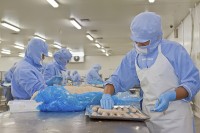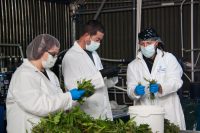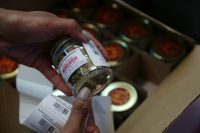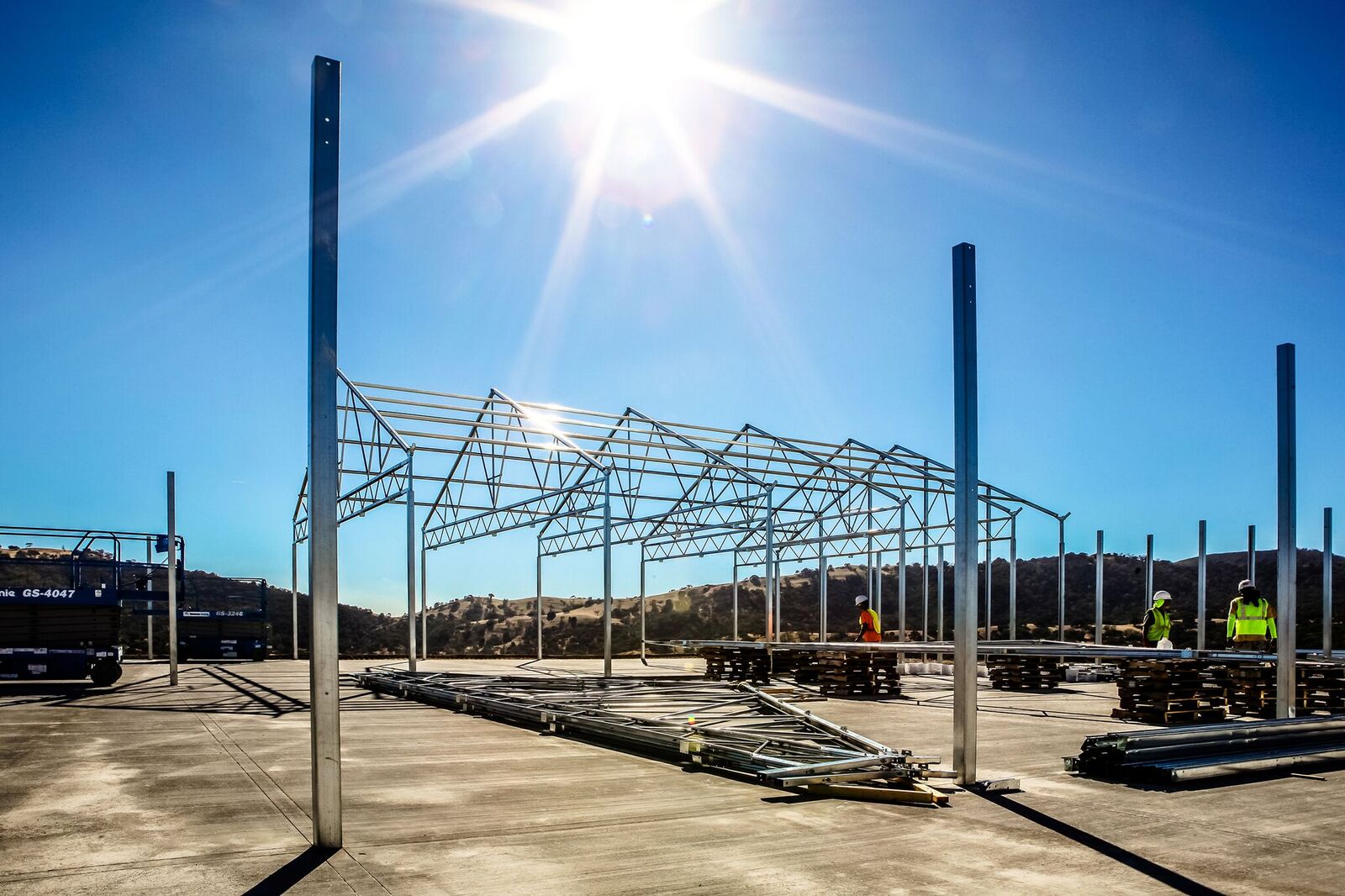The cannabis industry is growing and evolving at an unprecedented pace and regulators, consumers and businesses continually struggle to keep up.
Cannabis businesses: How do you maintain an edge on the market, avoid costly mistakes?
Case Study: Costly Facility Build Out Oversights
David Vaillencourt will be joining a panel discussion, Integrated Lifecycle of Designing a Cultivation Operation, on December 22 during the Cannabis Quality Virtual Conference. Click here to register. A vertically integrated multi-state operator wants to produce edibles. The state requires adherence to food safety practices (side note – even if the state did not, adherence to food safety practices should be considered as a major facility and operational requirement). They are already successfully producing flower, tinctures and other oil derivatives. Their architect and MEP firm works with them to design a commercial kitchen for the production of safe edibles. The layout is confirmed, the equipment is specified – everything from storage racks, an oven and exhaust hoods, to food-grade tables. The concrete is poured and walls are constructed. The local health authority comes in to inspect the construction progress, who happens to have a background in industrial food-grade facilities (think General Mills). They remind the company that they must have three-compartment sinks with hot running water for effective cleaning and sanitation, known as clean-out-of-place (COP). The result? Partial demolition of the floor to run pipeline, and a retrofit to make room for the larger sinks, including redoing electrical work and a contentious team debate about the size of the existing equipment that was designed to fit ‘just right.’
Unfortunately, this is just one more common story our team recently witnessed. In this article, I outline a few recommendations and a process (Quality by Design) that could have reduced this and many other issues. For some, following the process may just be the difference between being profitable or going out of business in 2021.
The benefits of Quality by Design are tangible and measurable:
- Reduce mistakes that lead to costly re-work
- Mitigate inefficient operational flow
- Reduce the risk of cross-contamination and product mix-ups. It happens all the time without carefully laid out processes.
- Eliminate bottlenecks in your production process
- Mitigate the risk of a major recall.
The solution is in the process
Regardless of whether you fall in the category of a food producer, manufacturer of infused products (MIP), food producers, re-packager or even a cultivator, consider the following and ask these questions as a team.
People

For every process, who is performing it? This may be a single individual or the role of specific people as defined in a job description.
Does the individual(s) performing the process have sufficient education and training? Do you have a diverse team that can provide different perspectives? World class operations are not developed in a vacuum, but rather with a team. Encourage healthy discourse and dialogue.
Process
Is the process defined? Perhaps in a standard operating procedure (SOP) or work instruction (WI). This is not the general guidance an equipment vendor provided you with, this is your process.
How well do you know your process? Does your SOP or WI specify (with numbers) how long to run the piece of equipment, the specification of the raw materials used (or not used) during the process, and what defines a successful output?
Do you have a system in place for when things deviate from the process? Processes are not foolproof. Do not get hung up on deviations from the process, but don’t turn a blind eye to them. Record and monitor them. In time, they will show you clear opportunities for improvement, preventing major catastrophes.
Materials
What are the raw materials being used? Where are they coming from (who is your supplier and how did you qualify them)?
 Start with the raw materials that create your product or touch your product at all stages of the process. We have seen many cases where cannabis oils fail for heavy metals, specifically lead. Extractors are quick to blame the cultivator and their nutrients, as cannabis is a very effective phytoremediator (it uptakes heavy metals and toxins from soil substrate). The more likely culprit – your glassware! Storing cannabis oil, both work in process or final product in glass jars, while preferred over plastic, requires due diligence on the provider of your glassware. If they change the factory in which it is produced, will you be notified? Stipulate this in your contract. Don’t find yourself in the next cannabis lead recall that gets the attention of the FDA.
Start with the raw materials that create your product or touch your product at all stages of the process. We have seen many cases where cannabis oils fail for heavy metals, specifically lead. Extractors are quick to blame the cultivator and their nutrients, as cannabis is a very effective phytoremediator (it uptakes heavy metals and toxins from soil substrate). The more likely culprit – your glassware! Storing cannabis oil, both work in process or final product in glass jars, while preferred over plastic, requires due diligence on the provider of your glassware. If they change the factory in which it is produced, will you be notified? Stipulate this in your contract. Don’t find yourself in the next cannabis lead recall that gets the attention of the FDA.
Savings is gained through simple control of your raw materials. Variability in your raw material going into the extractor is inevitable, but the more you can do to standardize the quality of your inputs, the less work re-formulating needs to be done downstream. Eliminate the constant need to troubleshoot why yields are lower than expected, or worst case, having to rerun or throw an entire batch out because it was “hot” (either too much THC in the hemp/CBD space or pesticides/heavy metals). These all add up to significant downstream bottlenecks – underutilized equipment, inefficient staff (increase in labor cost) all because of a lack of upstream controls. Use your current process as a starting point, but implement a quality system to drive improvement in operational efficiency and watch your top line grow while your bottom-line decreases.

Have you tested and confirmed the quality of your raw material? This isn’t just does it have THC and is it cannabis, but is it a certain particle size, moisture level, etc.? Again, define the quality of your raw materials (specifications) and test for it.
Remember – ranges are your friend. It is much better to say 9-13% moisture than “about 10%”. For your most diligent extractor, 11% will be unacceptable, but for a guy that just wants to get the job done, 13% just may do!
Test your final product AFTER the process. Again, how does it stack up against your specifications? You may need to have multiple specifications based on different types of raw material. Perhaps one strain with a certain range of cannabinoids and terpenes can be expected for production.
Review the data and trend it. Are you getting lower yields than normal? This may be due to an issue with the equipment, maybe a blockage has formed somewhere, a valve is loose, and simple preventive maintenance will get you back up and running. Or, it could be that the raw biomass quality has changed. Either way, having that data available for review and analysis will allow you to identify the root cause and prevent a surprise failure of your equipment. Murphy’s law applies to the cannabis industry too.
- You are able to predict and prevent most failures before they occur
- You increase the longevity of your equipment
- You are able to predict with a level of confidence – imagine estimating how much product you will product next month and hitting that target – every time!
- Business risks are significantly mitigated – a process that spews out metal, concentrates heavy metals or does not kill microbes that were in the raw material is an expensive mistake.
- Your employees don’t feel like they are running around with their hair on fire all the time. It’s expensive to train new employees. Reduce your turnover with a less stressed-out team.
Takeaways
Maintaining a competitive edge in the cannabis industry is not easy, but it can be made easier with the right team, tools and data. Our recommendations boil down to a few simple steps:
- Make sure you have a chemical or mechanical engineer to understand, optimize and standardize your process (you should have one of these on staff permanently!)
- Implement a testing program for all raw materials
- Test your raw materials – cannabis flower, solvents, additives, etc. before using. Work with your team to understand what you should and should not test for, and the frequency for doing so. Some materials/vendors are likely more consistent or reliable than others. Test the less reliable ones more frequently (or even every time!)
- Test your final product after you extract it – Just because your local regulatory body does not require a certain test, it does not mean you should not look for it. Anything that you specified wanting the product to achieve needs to be tested at an established frequency (and this does not necessarily need to be every batch).
- Repeat, and record all of your extraction parameters.
- Review, approve and set a system in place for monitoring any changes.
Congratulations, you have just gone through the process of validating your operation. You may now begin to realize the benefits of validating your operation, from your personnel to your equipment and processes.






